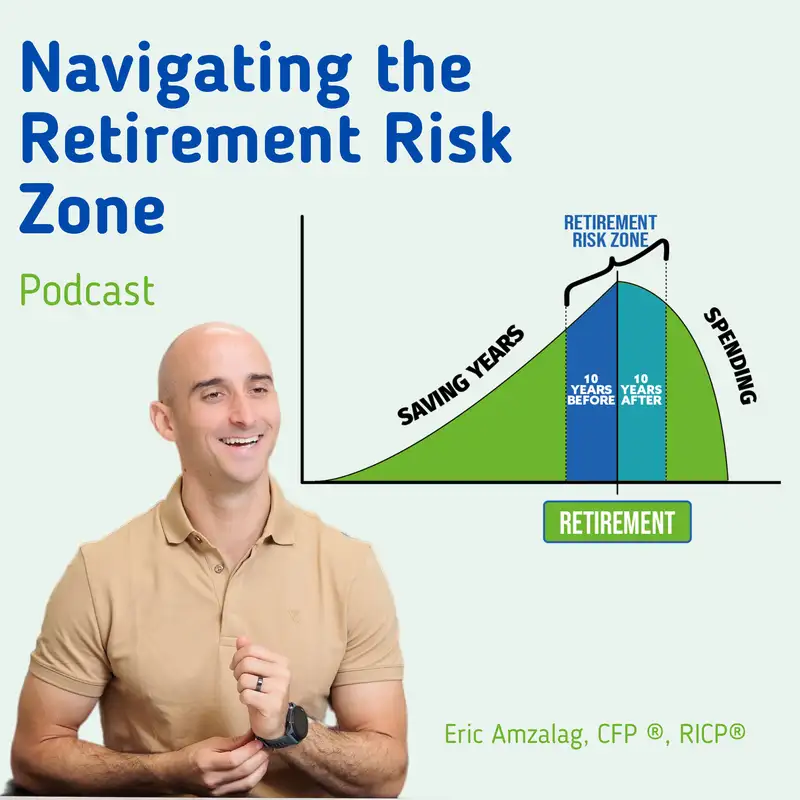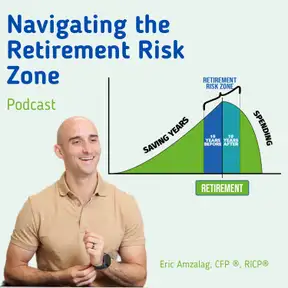The #1 Sign You Can Retire Earlier Than You Think
Today I am going to share
the most important sign
that you are ready to retire earlier
than you might think.
I've consulted over 100 pre retirees
in the last year alone,
and that experience has taught me
that people who are in a good place
to retire often do things that others
do not, knowingly or unknowingly.
Retirement is all about having plans
in place, proactive plans
that tell you what you should do,
but also reactive plans
that tell you what to do
in case of an emergency.
And those reactive plans
are what you rely on
when one of your proactive plans
goes wrong.
Now, the group of people
who are unknowingly in a good position
to retire early are frequently there
because they have been better
about preparing their proactive plants.
They have been better savers,
more disciplined investors.
But what they are missing
and why they don't believe they can retire
are those reactive plans,
the contingency plans
for when things go wrong.
But also modeling, talking about
and documenting how they would navigate
when things do go wrong.
Professionally,
I think about this experience
of setting up reactive systems
with a baseball analogy.
The more systems you have in place,
the more At-Bats you have.
See, a baseball player having more At-Bats
means that they have more opportunities
to hit the ball.
Well, it's the same in retirement.
So those people who are on track,
but may not feel on track,
usually have set themselves up for more At-Bats,
but very often unknowingly.
So what is the sign you can look for
to help identify whether you have
set yourself up for those At-Bats?
That sign is that you have started
shifting out of a saving mindset.
Instead of thinking,
how much should I save
and where should I save?
You start thinking about things like
how will I extract my retirement savings
in the most efficient manner possible?
Or should I do Roth conversions?
Now, often we subconsciously recognize
when we have enough,
even if our logical brain does
not come to that same conclusion.
So even though you may be watching this
and still feel anxious about
whether you do have enough.
Ask yourself, have I found myself
being drawn towards more
advanced retirement concepts.
Exploring things like
guardrails withdrawal strategies,
or Roth conversion break even ages,
or how sequence of returns risk
might affect my portfolio.
Now remember,
exploring those things are a sign
they are not the solution.
They are a sign that maybe
you actually have enough money to retire
and that you subconsciously know that.
And usually when I see this sign
during the consultation,
I dig a bit deeper
and I find that this person or couple
feels free to explore
those more advanced concepts,
because when asked if they think
they have enough money, they say yes.
And then when I ask them
why they haven't retired,
if they think they have enough money,
they usually don't have an answer.
And professionally,
I believe it comes down to the fact
that while they may have enough money,
they don't know the mechanics
of how to retire.
We often think that once we know
how much money we need to retire,
it will be simple to sail off
into retirement.
Not so.
We need to know how to retire.
How will I execute my finances
in retirement?
How will I craft a paycheck in retirement?
How will I pay taxes in retirement?
So frequently this group
are financially ready to retire.
They've got their retirement boat built,
but they don't really have
a navigation system
or an engine for their boat.
Which is why to me
they appear ready to retire.
Because I know the navigation system and
I know how to build a retirement engine,
but they themselves don't feel ready to
jump in a boat without a navigation system
or an engine and sail
across the unpredictable open ocean.
So, to quote
Alex Harmozi, a great businessman
and mentor of mine,
anxiety comes from having many options,
but a lack of clear priorities.
Having enough wealth to retire
doesn't actually help us prioritize.
In fact, it creates anxiety
because it creates more things
that we then have to prioritize.
I finally succeeded at this thing
I've been shooting for for in many cases,
30 plus years,
which is having enough money to retire.
And all of a sudden the door opens
to a whole new set of decisions
and priorities that I have no experience
with and no idea how to manage.
So even though we may know consciously
or subconsciously that
we have enough money to retire,
we don't have a clear way to prioritize
which retirement actions are
and navigation system
and the engine of our boat against
which actions are the accessories.
So let me say it now loud and clear.
Exploring Roth conversions or
strategies to minimize RMD taxes
or qualified charitable
distributions are distractions.
They are the accessories.
Figuring those things out first
is like slapping a mat wrap
or a spoiler on your boat.
Those are fine things to do,
but you need a navigation system
and an engine in order to drive the boat.
The navigation system
and engine of your retirement
boat are an expense tracking system.
An understanding of safe withdrawal rates,
a withdrawal system, and a real portfolio
risk management system.
Each of those systems gives you more
At-Bats to course correct your retirement,
helping you have a contingency plan to help
you react when something goes wrong,
which will thereby give you the confidence
to combat the uncertainty
and unpredictability that comes
with leaving the world you have known --
Employment.
For the world of the unknown -- Retirement.
Now, after hearing all of this,
I encourage you to ask yourself,
what systems have I set up that give me
the power to react when things go wrong?
And if there are things that I am nervous
about, for instance,
my portfolio going down
or my withdrawal rates being too high
or spending more than is responsible?
Am I nervous because I
haven't got a system in place
that I understand and feel confident
will give me tools to safely react
if something were to go wrong?
To share one final, easy
example that hammers this point home.
Asset allocations
are the most common risk management tool
that people use for their portfolios.
The asset allocation is
supposed to tell you to split your money
between risky and safe investments,
and that by doing so,
you have risk managed your investments.
But does your asset allocation
actually give you any tools
or a system that helps you react
when your portfolio goes down in value?
Absolutely not.
And that is why many of you watching,
despite using an asset allocation
to determine your investment portfolio,
still fear sequence of returns risk
because subconsciously
you know that an asset allocation is
an accessory,
not an engine or a navigation system.
And so with all of that said,
if you'd like to learn more
about how we help our clients
build confident, well-prioritize
retirement plans and retirement
portfolios, you can visit our website at
www.thepeakfp.com
Thank you, as always for
your time and attention,
and I'll see you in the next
video or the next podcast.
Creators and Guests


